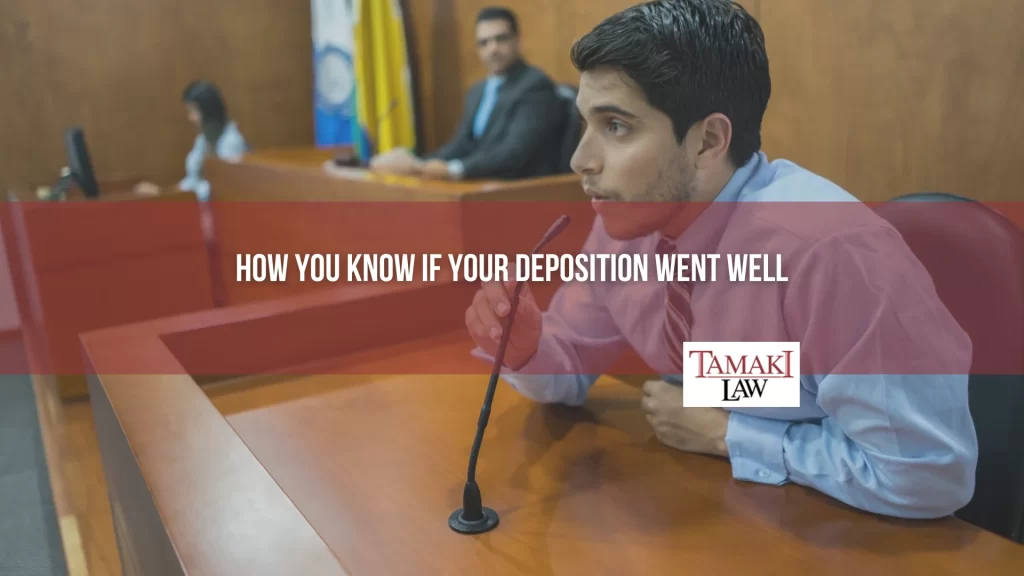
When you’ve been injured in an accident caused by someone else’s wrongdoing, the only way to get the compensation you deserve might be to take your case to court. If settlement negotiations break down and you decide to file a personal injury lawsuit, you will be called upon to give a deposition during the lead-up to a trial.
Being deposed by the opposing attorney can make you anxious. We will review the deposition process below and provide hints so yours goes smoothly. If you prepare well for the deposition and follow your attorney’s recommendations, your deposition should be just fine. Even after, though, you may be asking, “How do I know if my deposition went well?”
What Is a Deposition?
A deposition is a question-and-answer session where the opposing lawyer will ask you questions about the case. Depositions are part of the discovery process that occurs after you file a lawsuit. Depositions usually occur in a conference room at one of the attorney’s offices. Four people are present at the deposition: You, your attorney, the opposing attorney, and a court reporter.
Depositions take place for many reasons. The most popular reason is to help the opposing lawyer gather more information about the accident. Also, in a deposition, you’ll tell your story and lock in your testimony. The opposing attorney will search your deposition testimony for discrepancies between what you said and what the evidence shows.
Preparing for Your Deposition
Preparation is the key to success when you’ve been scheduled to be deposed. You and your attorney should review your entire case before your deposition. Together, you should review all documents from the case, including medical records, emails, pictures of the accident scene, and other vital documents.
Your attorney will prepare you for what to expect at the deposition. They’ll be able to anticipate many of the questions the opposing attorney will ask. You and your attorney will determine the best way to answer those questions and how to handle questions that might be a surprise. Your attorney might have you participate in a mock deposition in their office for practice.
Some actions you can take to make your deposition easier on yourself include getting enough sleep the night before, mapping the route to your deposition the night before you go, and arriving at your deposition on time. All these small things will help to reduce any anxiety you might be feeling. It’s important to be as calm and relaxed as you can during the proceedings.
Did Your Deposition Go Well?
You’ll know how the deposition is going as it progresses. If you feel calm and confident, it’s probably going well. If you can say that you followed these suggestions, your deposition did go well:
- Pause before answering – If you take a moment to fully comprehend the question you were asked, you can be sure you’re answering the question they asked and giving the answer you meant to.
- Tell the truth – Stick to the truth. Don’t exaggerate, mislead, or lie. Personal injury attorneys are skilled at taking depositions and have the experience to know when someone is not telling the exact truth. Additionally, if you lie during your deposition, you may not remember it, and your testimony at trial could be different than the testimony you gave at the deposition, which would be detrimental to your case. Always tell the truth, even if you don’t think it will help your case.
- If you don’t know the answer to the question, say so – As important as it is not to lie, it’s just as important not to guess at an answer. If you don’t know, don’t guess. Tell the opposing counsel, “I don’t know,” if you do not know the answer to a question.
- Keep your answers short and sweet – It is essential only to answer the question asked of you. Don’t elaborate on the answer or provide extra information. If you know of important information about the accident but the opposing attorney didn’t, you need not hand them extra facts.
Call Tamaki Law Today to Get Help with Your Case
 Depositions are an essential part of your case. Everything you say and how you say it can be significant. Working with an experienced personal injury attorney who can guide you through the deposition process and help you prepare is vital.
Depositions are an essential part of your case. Everything you say and how you say it can be significant. Working with an experienced personal injury attorney who can guide you through the deposition process and help you prepare is vital.
If you’ve been injured in an accident that wasn’t your fault, don’t handle your pursuit of the compensation you deserve on your own. The Washington personal injury lawyers at Tamaki Law have decades of experience with personal injury cases of all types. We will be there for you throughout the case and fight for your rights. Call us today at (800) 801-9564 for your free consultation, and let’s talk about how we can help.
Related Posts:
